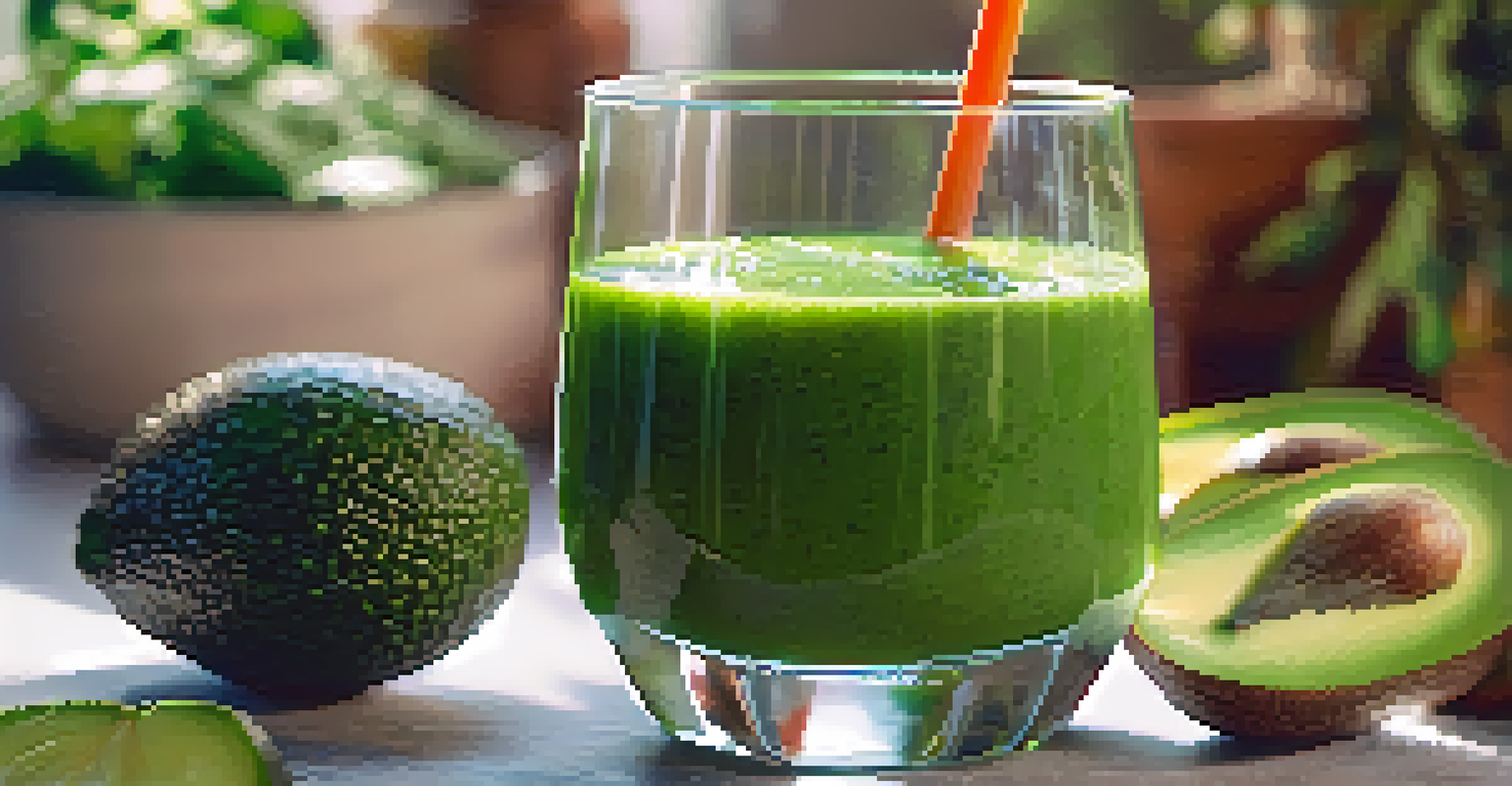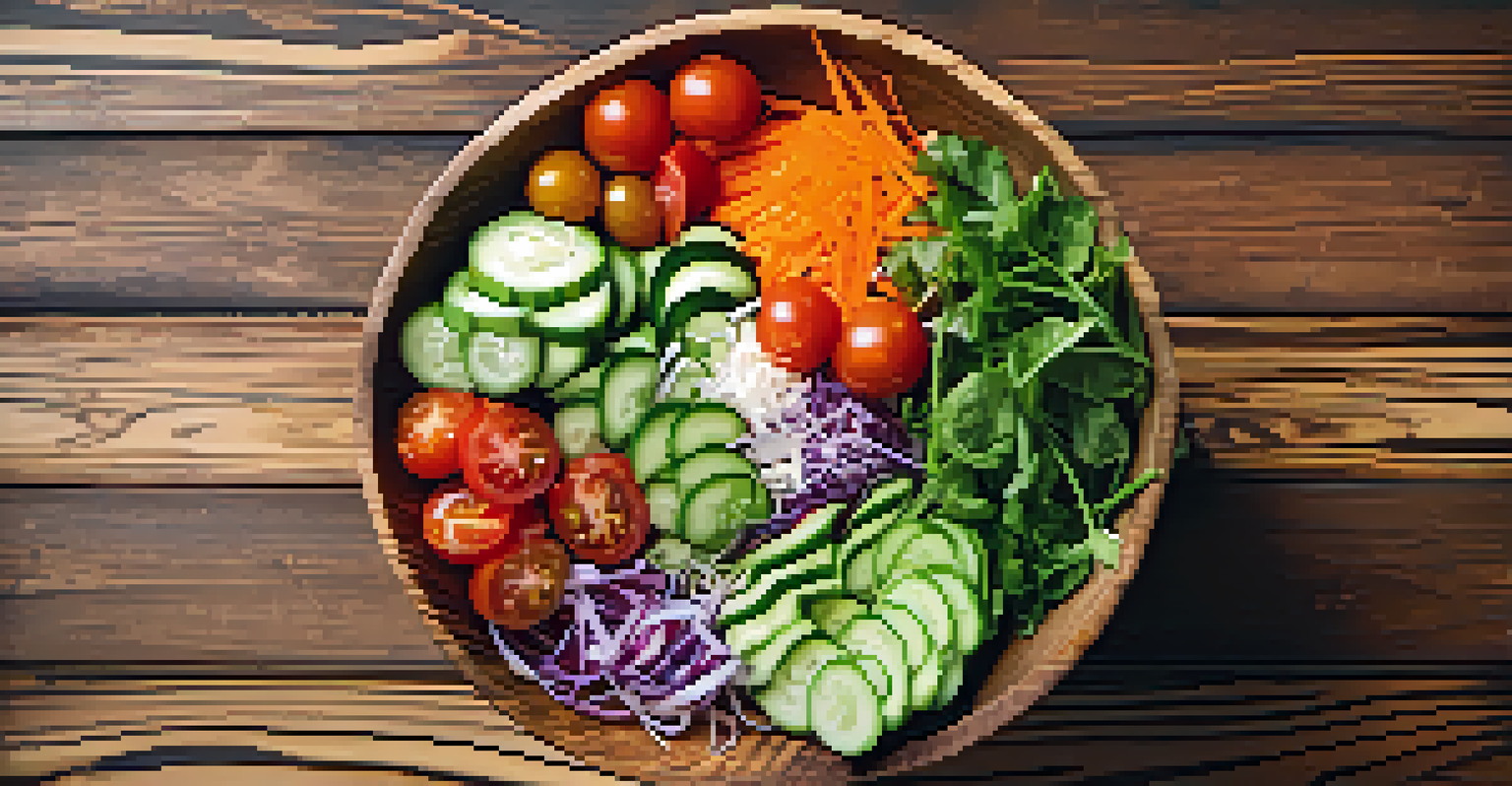Exploring Raw Food: Heart Health Benefits Revealed

What is a Raw Food Diet and Its Principles?
A raw food diet primarily consists of uncooked, unprocessed foods. This often includes fruits, vegetables, nuts, seeds, and sprouted grains. The idea is to preserve the natural enzymes and nutrients found in these foods, which are often diminished through cooking.
Let food be thy medicine and medicine be thy food.
People choose raw food diets for various reasons, including health benefits, environmental concerns, and ethical considerations regarding animal products. By focusing on whole, plant-based foods, raw food enthusiasts aim to nourish their bodies while also promoting sustainable living.
It's important to note that a raw food diet can vary in its strictness. Some individuals may include lightly cooked items or raw dairy, while others adhere strictly to completely uncooked foods. Regardless, the emphasis remains on fresh, organic produce.
Understanding Heart Health: The Basics
Heart health is crucial for overall well-being, as the heart plays a vital role in pumping blood throughout the body. This blood delivers oxygen and nutrients to organs and tissues, supporting various bodily functions. Maintaining a healthy heart can reduce the risk of cardiovascular diseases, which are among the leading causes of death worldwide.

Several factors influence heart health, including diet, exercise, stress management, and genetics. Adopting heart-healthy habits can significantly reduce the risk of heart disease and improve one's quality of life. This is where the raw food diet can come into play, offering unique benefits.
Raw Food Diet Basics
A raw food diet focuses on uncooked, unprocessed foods like fruits, vegetables, and nuts to preserve their natural nutrients.
Many raw foods are rich in nutrients that support heart health, such as vitamins, minerals, and antioxidants. By focusing on these foods, individuals can create a dietary pattern that promotes optimal cardiovascular function.
Nutritional Benefits of Raw Foods for Heart Health
Raw foods are packed with essential nutrients that can help lower cholesterol levels and blood pressure. For instance, fruits like berries and apples contain soluble fiber, which can help clear cholesterol from the bloodstream. Vegetables such as leafy greens are also rich in vitamins C and E, which are known to support heart health.
The greatest wealth is health.
Moreover, raw nuts and seeds provide healthy fats, including omega-3 fatty acids, which have anti-inflammatory properties. These fats are essential in reducing the risk of heart disease. By incorporating a variety of raw foods into your diet, you're not just adding flavor but also a wealth of nutrients that benefit your heart.
Additionally, the high water content in many raw fruits and vegetables can promote hydration and overall health. Staying hydrated supports circulation, which is crucial for maintaining a healthy heart.
Antioxidants in Raw Foods and Their Role
Antioxidants are compounds that help combat oxidative stress in the body, which can lead to heart disease. Raw foods, especially fruits and vegetables, are abundant sources of antioxidants like flavonoids, carotenoids, and vitamin C. These compounds work to neutralize free radicals, potentially reducing the risk of heart-related issues.
For example, foods like tomatoes and carrots are rich in lycopene and beta-carotene, respectively, both of which have been linked to improved heart health. By consuming a variety of colorful raw foods, you can ensure you're getting a diverse range of antioxidants to support your cardiovascular system.
Heart Health Benefits
Raw foods are rich in essential nutrients, antioxidants, and fiber, all of which support cardiovascular health.
Incorporating raw foods into your diet can be a delightful way to boost your antioxidant intake. Smoothies, salads, and raw snacks can be both delicious and heart-healthy, making it easier to incorporate these vital nutrients into your daily routine.
The Role of Fiber in a Raw Food Diet
Fiber is a key component of a heart-healthy diet, and raw foods are typically high in fiber. It helps lower cholesterol levels, improve digestion, and maintain a healthy weight, all of which are essential for heart health. Foods like beans, lentils, and whole grains are excellent sources of fiber, but raw fruits and vegetables also contribute significantly.
For instance, fruits like oranges and apples provide both soluble and insoluble fiber, supporting heart health and overall digestive function. By consuming a variety of high-fiber raw foods, you can create a balanced diet that supports your heart while keeping you feeling full and satisfied.
Including fiber-rich foods in your raw diet can help regulate blood sugar levels and reduce the risk of developing type 2 diabetes, another risk factor for heart disease. This makes fiber an essential player in your journey towards better heart health.
Potential Challenges of a Raw Food Diet
While a raw food diet offers numerous benefits, it can also present some challenges. Adapting to this lifestyle may require significant changes in your eating habits, which can be daunting. Some individuals may struggle to find a variety of foods that keep them satisfied or may experience cravings for cooked foods.
Another concern is ensuring you're getting all the necessary nutrients, such as protein, calcium, and vitamin B12, which are often found in animal products. It's essential to plan meals carefully and consider supplementation if you're following a strict raw food diet.
Challenges of Raw Food Diet
Transitioning to a raw food diet can be challenging due to potential nutrient deficiencies and limited food options in social settings.
Lastly, social situations can also pose challenges, as dining out or attending gatherings may limit your food options. However, with a little creativity and planning, you can navigate these hurdles while enjoying the benefits of a raw food lifestyle.
Getting Started with a Raw Food Diet for Heart Health
If you're interested in exploring a raw food diet for heart health, start by incorporating more raw fruits and vegetables into your meals. Consider experimenting with smoothies, salads, and raw snacks to make the transition enjoyable. Gradually replacing cooked meals with raw options can help ease the change without feeling overwhelming.
It's also beneficial to join a community or find resources that support raw food enthusiasts. Whether it's online forums, cookbooks, or local groups, connecting with others can provide inspiration and motivation. Sharing experiences and recipes can make the journey more enjoyable and less isolating.

Remember, the key to a successful raw food diet is balance and variety. Focus on incorporating a wide range of raw foods to ensure you're getting a diverse array of nutrients that support your heart and overall health.